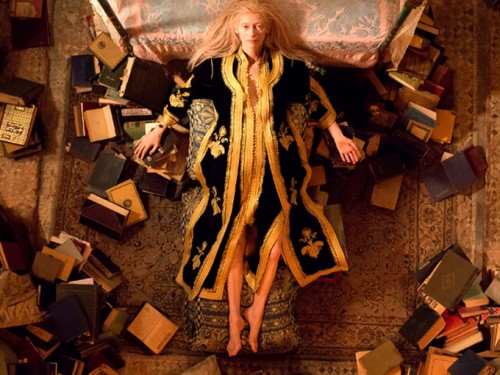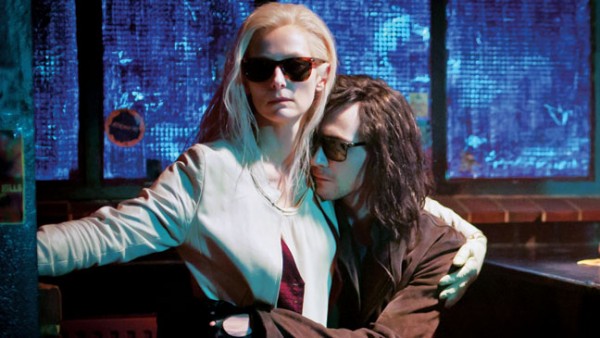Stars swirling in the cosmos. A record turning on a turntable. The camera drifts in circles over a woman lying like Millais’ Ophelia amidst a sea of books, and a man in a similar pose, clutching a lute—all set to the screeching vocals and dissonant guitar of Wanda Jackson’s ‘Funnel of Love’. This is director Jim Jarmusch’s dizzying, hypnotic introduction to Only Lovers Left Alive, a meditation on love, life and art that also happens to be a rock-n-roll vampire film.
Adam (Tom Hiddleston) and Eve (Tilda Swinton) have been married for centuries. Ageless and immortal, they are accustomed to spending long periods apart: he composes music in the ruins of Detroit; she reads books and wanders through Tangier with her friend and fellow vampire Christopher Marlowe (John Hurt). When Adam grows dangerously depressed, Eve visits to cheer him up, but their reunion is interrupted by the arrival of her troublesome younger sister, Ava (Mia Wasikowska).
And that’s about it. Jarmusch, who also wrote the screenplay, isn’t particularly interested in horror or gore. Instead, Only Lovers is a mood piece—existential ennui as experienced by the undead.
Adam does most of the brooding; Eve, his complete opposite, simply enjoys being alive. A Byronic hero (who in fact befriended Byron and Shelly), Adam lives in almost complete isolation, watching the world crumble. Humans have been reckless as only the short-lived can be, squandering the earth’s resources and poisoning the environment. (Even our very blood is contaminated: Eve relishes her small stock of “the good stuff”, while Adam is careful about his supplier.) Bored with a world he thinks is disintegrating around him, Adam is blind to the little things that give Eve pleasure: a clump of mushrooms growing out of season; a good book; a homemade blood popsicle. Marlowe calls Adam a “suicidally romantic scoundrel”, but Eve is still horrified when she discovers a gun loaded with wooden bullets and realizes just how close her husband came to killing himself. “How can you have lived for so long and still not get it?” she asks, furiously. “This self-obsession is a waste of living. It could be spent on…surviving things, appreciating nature, nurturing kindness and friendship…and dancing!” Eve is a consummate survivor who embraces life in all of its beauty and pain, and in Jarmusch’s eyes, that’s the whole point of living.
Having something to live for also helps, and for Adam and Eve, art is one of the things that give their existence meaning. Time has made them connoisseurs. (Or as Ava prefers, “condescending snobs”.) Adam collects vintage musical instruments, and despite dismissing humans as mindless “zombies”, has an entire wall dedicated to photos of artists he admires, including Mark Twain, Edgar Allan Poe, Buster Keaton and Jarmusch’s mentor, Nicholas Ray. When Eve packs her things for Detroit, she whittles down her book collection to David Foster Wallace’s Infinite Jest and a handful of books in French, German, Arabic and Chinese. And one of the couple’s closest friends is Christopher Marlowe, the true author of Shakespeare’s plays—he just happened to be undead by the time most of them were first staged. (Jarmusch is a self-confessed anti-Stratfordian and believes Marlowe and the Earl of Oxford, among others, wrote Shakespeare’s plays.) In a post-screening talk I went to at the Nitehawk Cinema in Brooklyn, Jarmusch said he thought of Eve as a self-sufficient Classicist and Adam as an insecure Romantic: she is happy just to observe, but he needs constant validation. That’s why Adam sends his music out into the world, even giving Schubert part of a string quintet—he needs to know what people think of his work.
Jarmusch’s film is stuffed with weighty ideas yet never seems dull, thanks to a great cast. Tom Hiddleston and Tilda Swinton are old hands when it comes to the otherworldly. Hiddleston shot to fame as the trickster god Loki in Thor, while Swinton was the White Witch in The Chronicles of Narnia and, more significantly in regards to Eve, played the ageless, androgynous, literature-loving central character in Orlando. With his long black hair, pale skin and all-black wardrobe, Adam looks like an emo teenager’s idea of a vampire, but Hiddleston invests him with a mixture of gravity, weariness and wry humour that’s utterly compelling. His halting, oblique conversations with general dogsbody Ian (Anton Yelchin) are some of the funniest in the film. “You know, being so reclusive is only going to make people more interested in your music,” Ian tells him. “What a drag,” Adam replies, with a sigh. Blonde and often dressed in white, Eve is Adam’s obvious foil and Swinton gives her a practical but playful air which compliments Adam’s introspection. She teases him, bests him at chess and coaxes him back into the land of the ‘living’ by dancing with him. They seem so attuned to each other’s rhythms that it’s a wonder Hiddleston and Swinton had never been paired before. Mia Wasikowska’s Ava channels Claudia, the eternally spoilt child from Interview with the Vampire, while Jeffrey Wright pops up as a sardonic lab technician and John Hurt makes a nicely grizzled Marlowe.
Only Lovers Left Alive is a witty, intensely romantic film about vampires that’s also filled with wise thoughts on what it means to be human. We may struggle and suffer, but as Adam learns, love, beauty and art are well worth living for.


Leave a Reply